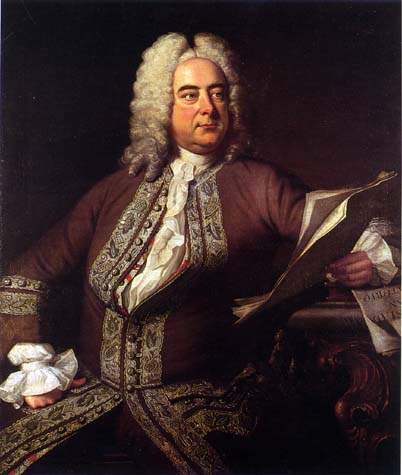
George Frideric Handel
Handel is universally recognized as one of the great composers of any era, and certainly of the Baroque era. The enormous popularity of his oratorio Messiah has tended to obscure most of his other important and beautiful works. He composed vocal and instrumental works of every popular genre in his day, but his primary interest lay in works for the theater.
He was quite a modern fellow, equally at home with the newest musical styles of Germany, Italy, France, and England. He also achieved the status of international star, dazzling audiences in Germany, Italy, and England. We will follow his career as he moved from Germany to Italy and finally to England.

Personal Data
Dates: 1685-1759
Born: Halle, Germany
Residences: Halle, Hamburg, Italy, Hannover, London
Timeline
Biographical Overview
Handel’s father intended for him to study law and discouraged any interest in music, even forbidding him from having a musical instrument. Handel nevertheless sneaked a clavichord into the attic. On a subsequent visit to his considerably older half brother in nearby Weissenfels, Handel’s organ playing impressed the duke. Handel’s father did relent and allowed the boy to study music while also preparing for a career in law. Consequently. Handel received solid instruction in organ, harpsichord, violin, theory and composition.
The German “Apprentice Period”
In 1703, Handel moved to Hamburg, which at the time boasted the only regular opera company in Germany. He landed a job as violinist in the opera orchestra. Shortly thereafter, Handel began writing operas with spotty success. His writing was described as strong in harmony and counterpoint (typical German strengths) but weak in melody. Many of his keyboard and instrumental works, though later revised, presumably originated in this same period.
The Italian “Journeyman Period”
Handel’s skill as a composer took an enormous leap forward during his years in Italy, 1706-1710. Italy was the home of opera and oratorio as well as important instrumental forms. There he came into contact with important patrons and other prominent composers, including Arcangelo Corelli and both Alessandro and Dominico Scarlatti.
According to musicologist Manfred Bukofzer, “What Handel still lacked was neither contrapuntal skill nor melodic inventiveness, but the cantabile style of the melody, the unmistakable idiom of the Italian bel canto.”
In Italy, Handel was exposed more broadly to Italian opera and became a superb melodist. Moving through Florence, Rome, Venice, and Naples, Handel produced an impressive body of music, including two operas (Rodrigo and Agrippina), two oratorios (Il trionfo del Temp e del Disinganno and La Resurrezione), and as many as 150 cantatas.
Tu del Ciel ministro eletto
Did Handel truly master the art of melody while in Italy? Consider the aria Tu del Ciel ministro eletto from his first oratorio Il trionfo del Tempo e del Disinganno (The Triumph of Time and Truth) composed in 1707.
(This video is truncated. For a complete performance of this aria click here.)
(You must be logged into the Circle of Scholars to view the rest of this page.)
